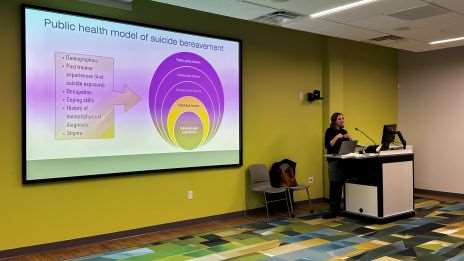Suicide Postvention Certificate Course
Course description
This course offers a comprehensive overview of suicide postvention—interventions following a suicide that support loss survivors and reduce future suicide risk. Participants will explore the foundations of suicide prevention, the history and research behind postvention, and how it differs from other therapeutic approaches after a loss. Emphasis is placed on understanding trauma responses, cultural factors in grief, and strategies for supporting individuals and communities affected by suicide. The course also guides participants in designing and implementing effective postvention teams, including needs assessments, partnership building, training, and culturally responsive communication. A final project will involve compiling local and national resources and developing a needs assessment and/or implementation plan for a postvention response within the participants’ community.Course Info
- Dates: August 25-December 9
- Delivery Method: Live online
- Time: 10-11 a.m. CST
- Platforms: Zoom & Google Classroom
- Instructors: Sara Kohlbeck, PhD, MPH; Tricia Monroe, MEd, MA, MCHES
- Fee: Free
- CEUS: None
- Certificate provided; 16 hours of completion
Benefits and Learning Outcomes
By the end of this course, participants will be able to:
- Define key concepts in suicide prevention and explain the role of postvention in reducing suicide risk.
- Differentiate postvention from other therapeutic approaches and summarize its historical development and research foundations.
- Identify trauma responses and the unique grief experiences of suicide loss survivors, including racial and cultural considerations.
- Demonstrate effective strategies for supporting individuals and communities after a suicide loss.
- Analyze existing postvention guidelines for schools, workplaces, and community settings.
- Develop components of a comprehensive postvention plan, including partnerships, needs assessments, data considerations, and team training.
- Design culturally competent communication and outreach strategies for postvention efforts.
- Create a final project that includes a resource guide and a needs assessment and/or implementation plan for a postvention response.
Instructor Bios

Sara Kohlbeck, PhD, MPH
Dr. and Mrs. Michael C. Kubly Community-Based Suicide Prevention Research Professorship; Assistant Professor; Director, Division of Suicide Research and Healing
Sara Kohlbeck is the Director of the Division of Suicide Research and Healing in the Comprehensive Injury Center at the Medical College of Wisconsin. She is also an Assistant Professor in the Department of Psychiatry and Behavioral Medicine. Sara received her PhD in Public and Community Health from the Medical College of Wisconsin in 2022, her Master of Public Health from the University of Wisconsin-Milwaukee in 2015, and her Bachelor of Science in Education from the University of Wisconsin-Oshkosh in 2000. Sara’s research interests focus on understanding suicide from a public health perspective. Specifically, she is conducting research that focuses on better understanding suicide among disproportionately affected populations, including farmers, veterans, and youth of color, to facilitate the development of appropriate prevention strategies. She is also engaged in community-based research with communities across Wisconsin who are implementing suicide prevention activities.

Tricia Monroe, MEd, MCHES
Community Program Manager I
Tricia Monroe serves as the Suicide Postvention Program Manager within the Division of Suicide Research and Healing in the Comprehensive Injury Center at the Medical College of Wisconsin. She conducts active outreach to survivors of suicide loss within Milwaukee County, identifying best practices for supporting individuals after a loss and developing a community-wide response that considers cultural and linguistic needs. Since 2023, Tricia has facilitated a statewide postvention community of practice that has grown to almost 50 members. Tricia earned a master’s in health education and Promotion from East Carolina University and is a Master Certified Health Education Specialist. Her work has included research related to health inequities, chronic illnesses, school based mental health programming, and suicide prevention. She has training in Mental Health First Aid and received Grief Support Specialist training from University of Wisconsin Madison. Her research and professional interests include postvention practices within a social justice framework, grief experiences after a suicide loss across racial and ethnic populations, and community empowerment through collaborative academic partnerships.
Who Should Attend
This course is ideal for professionals who work with individuals, families, or communities affected by suicide, especially those involved in crisis response, mental health, education, and public health. Specifically, the following professionals would benefit from attending: 
- Mental Health Clinicians (e.g., psychologists, counselors, social workers, marriage and family therapists)
- School Personnel (e.g., school counselors, administrators, school psychologists, social workers)
- Crisis Responders and First Responders (e.g., crisis team members, EMTs, firefighters, police officers)
- Funeral and Death Care Professionals
- Public Health Professionals working in suicide prevention or behavioral health
- Grief and Bereavement Counselors
- Workplace HR and Wellness Coordinators responsible for employee support after traumatic events
- Faith Leaders and Spiritual Care Providers supporting congregants or community members after a suicide
- Community Outreach Coordinators and nonprofit staff focused on mental health or trauma
- Researchers and students in psychology, social work, public health, or related fields

